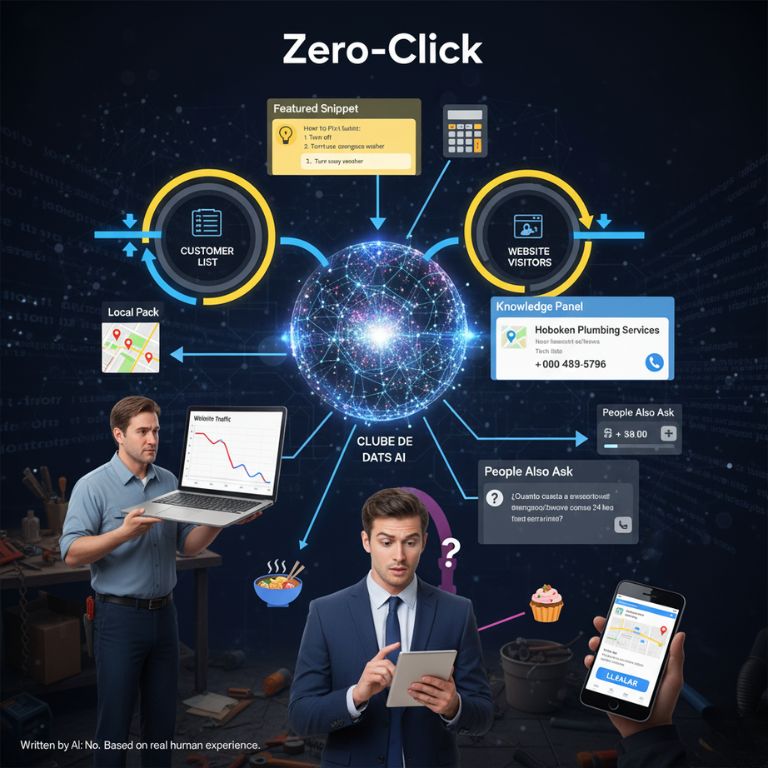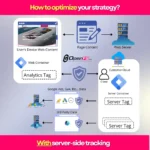What is zero-click search and how does AI make it work?
Zero-click search occurs when people find information directly on Google’s results page without clicking through to any website. AI technology powers this by analyzing search intent, extracting relevant content from web pages, and instantly displaying it through featured snippets, knowledge panels, and other SERP features – fundamentally changing how over 65% of searches now function.
My neighbor knocked on my door yesterday asking about a plumber. I watched him search on his phone, call directly from Google’s results, and book an appointment – all without visiting a single website. That interaction stuck with me because it perfectly captures what’s happening across search right now.
The Reality of Zero-Click Results in 2025
Zero-click search isn’t some abstract concept anymore. When you searched for movie times last weekend or checked restaurant hours, you probably got everything right there on Google. No clicking required.
The forms these instant answers take vary widely. Featured snippets grab that prime “position zero” spot. Knowledge panels populate the right side with business info, operating hours, phone numbers. Local pack results dominate “near me” searches with maps and direct contact options. Then there’s People Also Ask boxes that expand with related questions, plus built-in calculators and converters.
I’ve watched this evolution reshape client expectations completely. A roofer in Morristown called me panicked because his website traffic dropped 35%. But his phone was ringing constantly from local pack appearances. Sometimes the numbers tell one story while reality tells another.
How AI Creates These Instant Answers
The AI behind zero-click results has gotten scary good at understanding what we actually want. It’s not just matching keywords anymore – these systems comprehend context and intent at a deeper level.
Google’s language models (BERT, MUM, and whatever they’re testing internally) process searches differently now. Type “pizza open now” and the AI recognizes you’re hungry, nearby, and need current information – not the history of Italian cuisine.
Machine Learning’s Role in Smart Results
The algorithms running this show constantly evolve. They track which snippets satisfy users, which trigger follow-up searches, which formats work for different query types. It’s a continuous feedback loop.
One bakery owner I work with noticed her recipe snippets kept vanishing. Turns out the ML algorithms detected users still clicking through for ingredient measurements. We reformatted with exact quantities upfront, snippets stuck, and her catering inquiries jumped significantly. Sometimes minor adjustments create major shifts.
For technical details on how this works, check out our breakdown of machine learning for SEO.
What Zero-Click Actually Means for Your Business
The impact varies wildly depending on your industry and how you adapt. Some businesses struggle while others thrive in this new environment.
Real Challenges Worth Acknowledging
- Website traffic often drops when Google answers directly
- Converting visitors becomes trickier through snippet-sized content
- Building brand personality gets harder in 40-word chunks
- Traditional metrics miss important conversions
But here’s what most doom-and-gloom articles miss…
Opportunities Hidden in Plain Sight
That roofer I mentioned? His website sessions dropped but business increased. He optimized for local visibility, made calling simple, and now fields more qualified leads than before.
Featured snippets beat even #1 organic rankings for visibility. Direct call buttons drive immediate action. Being Google’s chosen answer establishes instant credibility. And visitors who do click through often arrive ready to buy.
Practical Strategies for Zero-Click Optimization
After implementing these tactics across dozens of client accounts, certain patterns emerge consistently.
Structured Data Implementation
Think of structured data as giving Google a cheat sheet for your content. Without it, you’re making AI guess what your content means.
Essential schema implementations include LocalBusiness for physical locations, FAQ schema for question content, HowTo for tutorials, Product schema with pricing details, and Review schema for social proof.
An Italian restaurant added recipe schema last spring. Their signature dishes started appearing in rich results within weeks. Website traffic stayed flat but catering inquiries surged. That’s the power of proper markup.
Need help implementing? Our structured data guide walks through the technical setup.
Capturing Featured Snippets Through Format
Getting featured snippets requires intentional formatting, not luck. Direct answers within 40-60 words work best. Structure content with clear headers, bullets, and numbered lists. Target question-based searches. Build comprehensive FAQ sections using natural language patterns.
An HVAC company created content answering “Why is my AC not cooling?” They nailed the format – brief intro, bulleted causes, detailed explanations. Now they own that snippet and field dozens of service calls monthly from it.
Local Search Optimization Beyond Basics
For local businesses, zero-click represents opportunity more than threat. Most location-based searches end without clicks, yet drive real business.
Critical optimization steps: Complete every Google Business Profile field thoroughly. Upload fresh photos regularly (shows activity). Respond to reviews quickly. Use Google Posts for updates. Maintain NAP consistency everywhere. Create dedicated location pages.
Struggling with local visibility? Our local SEO guide for New Jersey businesses covers advanced tactics.
Diversifying Your Digital Strategy
Relying solely on organic traffic was risky before zero-click. Now it’s business suicide.
Strategic Paid Search Implementation
Interestingly, zero-click makes paid search campaigns more valuable. You can appear above featured snippets with proper targeting.
Focus on commercial intent keywords that rarely trigger snippets. Use every available ad extension. Create urgency that snippets can’t match. Implement aggressive remarketing for snippet viewers.
A home services client combined organic snippet optimization with targeted Google Ads. Despite less organic traffic, lead volume increased substantially.
Creating Click-Worthy Content
Your content needs dual purpose now – snippet-worthy answers plus compelling reasons to click through.
Layer content with quick answers up top, fascinating details below. Build interactive tools and calculators. Share original research and data. Tell stories that demand full reads.
Measuring Success in a Zero-Click World
Traditional metrics tell incomplete stories now. CTR obsession measures yesterday’s game.
Track brand search volume increases. Monitor Google Business Profile actions. Count featured snippet ownership. Analyze conversion rate improvements. Implement proper phone call tracking.
One client watched sessions drop 20% while revenue grew 35%. Better qualified traffic from featured snippets combined with direct calls from local results. Context matters more than raw numbers.
Preparing for AI’s Next Evolution
The AI-search relationship will only deepen. Early signals suggest major shifts ahead.
Voice assistants increasingly pull from featured snippets. Visual search merges with zero-click results. Hyper-personalized SERPs show different results per user. Conversational search enables multi-turn queries without clicks.
These aren’t distant possibilities – they’re being tested now. For more on what’s coming, see our analysis of AI overviews in Google search.
Making Zero-Click Work for You
Zero-click search powered by AI isn’t disappearing. Fighting it wastes energy better spent adapting.
Successful businesses show up in featured snippets, dominate local packs, leverage paid search strategically. They measure success differently and see results.
Whether you need technical SEO implementation, conversion-focused web design, or comprehensive strategy, adapting starts with understanding how AI shapes modern search.

Frequently Asked Questions
What exactly is zero-click search and why should my business care?
Zero-click search happens when users get answers directly on Google without clicking any links. You should care because 65% of searches end this way, fundamentally changing customer discovery. While it can reduce website traffic, appearing in featured snippets or local results often drives more calls and visits than traditional clicks.
How does AI specifically create more zero-click searches?
AI powers zero-click by understanding user intent beyond keywords. Models like BERT and MUM analyze context, extract relevant information from websites, and display it instantly. The AI constantly learns which answers satisfy users, improving accuracy and expanding which queries trigger zero-click results.
Can zero-click search actually help my business or just hurt website traffic?
While zero-click often reduces website traffic, it can significantly boost business through increased visibility and direct actions. Featured snippets position you as an authority, local pack results drive phone calls, and remaining traffic usually has higher purchase intent. Many businesses see revenue grow even as traffic drops.
 Written by: Romulo Vargas Betancourt
Written by: Romulo Vargas Betancourt
CEO – OpenFS LLC







